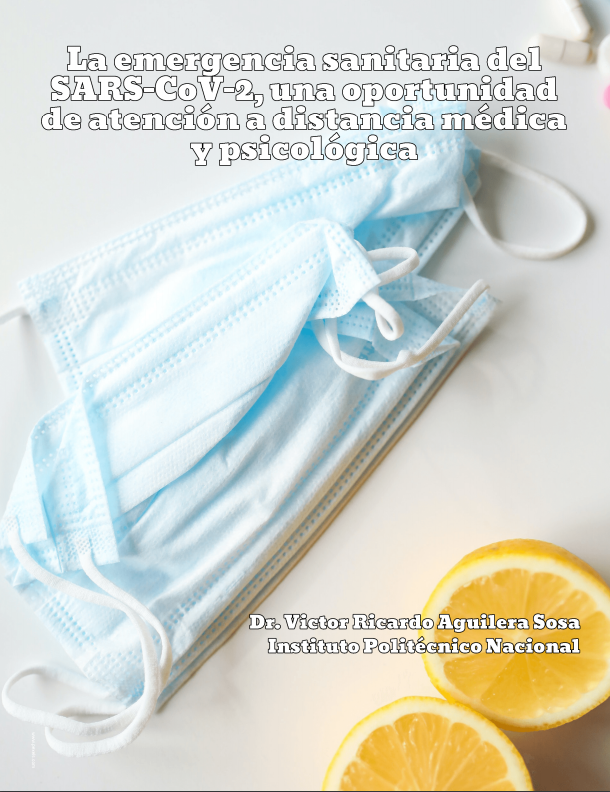La emergencia sanitaria del SARS-CoV-2, una oportunidad de atenci´on a distancia m´edica y psicol´ogica
Abstract
The new SARS-CoV-2 coronavirus and Covid-19 changed not only the state of health, and the control of mortality, mainly in countries with strong health systems, brought about social, economic, psychological and interactional crises; and it exacerbated the lack of health care due to the saturation of hospitals in the world. Despite the fact that telemedicine was already a viable option since the appearance of the web, it was that with the pandemic the population looked for different types of care, ranging from the call center, to the use of health applications. The objective of this article is to describe telemedicine options, as well as to denote the importance of taking care of ethical protocols, guidelines and procedures.
Conclusion: The increased prevalence of anxiety disorders, stress, sleep disorders, depression and fear, can be treated remotely effectively and efficiently; however, it is essential that the services offered maintain security, validity and functionality principles, supported by guidelines and protocols, and the exercise of ethical analysis related
to health care.
Downloads
References
2. Byung-Chul Han. La pandemia vuelve a hacer visible la muerte. Entrevista sobre la situación del mundo ante la pandemia de coronavirus. Mileno diario. México. Revisado el Domingo, 02(08/2020, 13:54 de: https://www.milenio.com/cultura/byung-chul-han-la-pandemia-vuelve-a -hacer-visible-la-muerte (2020).
3. Carregal, Mayo & Bustabad. Telemedicina, una nueva herramienta para la gestión del dolor. Resultados de su implementación en una estructura organizativa de gestión integral (EOXI). Rev. Soc. Esp. Dolor, 27 (2):97-103. http://dx.doi.org/ 10.20986/resed.2020.3756/2019 (2020).
4. Contreras CM, Metzger GA, Beane JD, Dedhia PH, Ejaz A, Pawlik TM. Telemedicine: Patient-Provider Clinical Engagement During the COVID-19 Pandemic and Beyond. J Gastrointest Surg., 24(7):1692-1697. doi:10.1007/s11605-020- 04623-5 (2020).
5. Giuseppina La Rosa, Marcello Iaconelli , Pamela Mancini, Giusy Bonanno Ferraro, Carolina Veneri, Lucia Bonadonna, Luca Lucentini & Elisabetta Suffredini. First detection of SARS-CoV2 in untreated wastewaters in Italy. Sci Total Environ; 736:139652. doi: 10.1016/j.scitotenv.2020.139652. (2020).
6. Hollander JE, Carr BG. Virtually Perfect? Telemedicine for Covid-19. N Engl J Med., 382(18):1679-1681. doi:10.1056/NEJMp2003539 (2020).
7. Huang. Y. & Zhao N. Mental health burden for the public affected by the COVID-19 outbreak in China: Who will be the high-risk group? Psychology, Health & Medicine, Apr 14; 1-12 DOI: 10.1080/13548506.2020.1754438 (2020).
8. Mindful, S.A.P.I. de C.V. Jenny, Entrena tu mente como entrenas tu cuerpo. Pagina web y aplicación, revisado de: https://jenny.com.ai/ (2020).
9. Ming LC, Untong N, Aliudin NA, et al. Mobile Health Apps on COVID19 Launched in the Early Days of the Pandemic: Content Analysis and Review. JMIR Mhealth Uhealth, 10.2196/19796. doi:10.2196/19796 (2020).
10. OMS. Brote de enfermedad por coronavirus (COVID-19). Emergencias Sanitarias. Revisado el 1 de agosto del 2020, 20 hrs: https://www.who.int/es/emergencies/ diseases/novel-coronavirus-2019 (2020).
11. Jimeno, P. Psychological effects of COVID-19. Arch Soc Esp Oftalmol, S0365-6691(20)30245-8. doi:10.1016/j.oftal.2020.06.010 (2020).
12. Secretaría General del Instituto Politécnico Nacional. Cuida IPN Salud Emocional de la Comunidad Politécnica ante Confinamiento por Covid-19. Comunicado de prensa Comunicado 077, 17 de mayo de 2020. Revisado de: https://www.ipn.mx/assets/files/ccs/ docs/comunicados/2020/05/c-077.pdf (2020).
13. SEDESA. Página electrónica Covid-19. Gobierno de la Ciudad de México. Revisado de: https://covid19.cdmx.gob.mx/ (2020).
14. Tolsa A. Coronavirus SARS-CoV2: estructura, mecanismo de infecci´on y c´elulas afectadas. Genética Médica News. Revisado de: https:// genotipia.com/genetica_medica_news/ coronavirus-estructura-infeccion-cel ulas/ (2020).
15. Urzúa, Alfonso, Vera-Villarroel, Pablo, Caqueo-Urízar, Alejandra, & Polanco-Carrasco, Roberto. La Psicología en la prevención y manejo del COVID-19. Aportes desde la evidencia inicial. Terapia psicológica, 38(1), 103-118. https://dx.doi.org/10.4067/S0718-48082020000100103 (2020).






